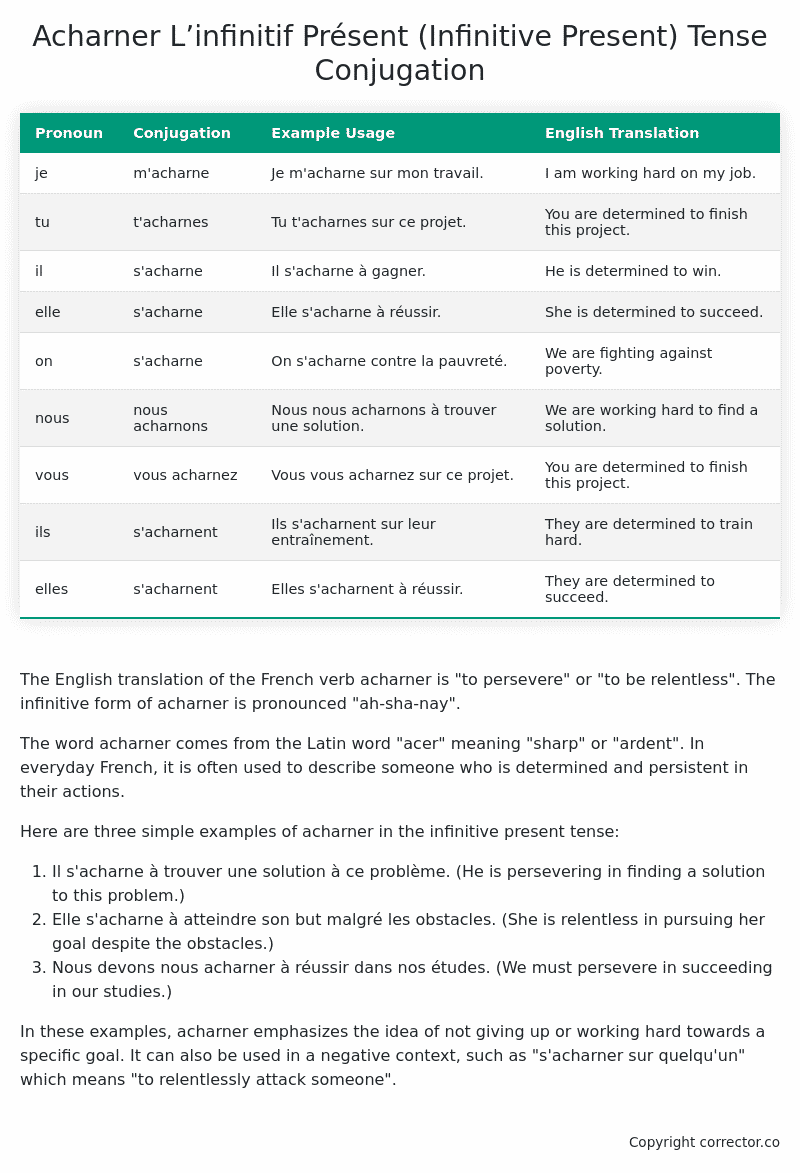L’infinitif Présent (Infinitive Present) Tense Conjugation of the French Verb acharner
Introduction to the verb acharner
The English translation of the French verb acharner is “to persevere” or “to be relentless”. The infinitive form of acharner is pronounced “ah-sha-nay”.
The word acharner comes from the Latin word “acer” meaning “sharp” or “ardent”. In everyday French, it is often used to describe someone who is determined and persistent in their actions.
Here are three simple examples of acharner in the infinitive present tense:
- Il s’acharne à trouver une solution à ce problème. (He is persevering in finding a solution to this problem.)
- Elle s’acharne à atteindre son but malgré les obstacles. (She is relentless in pursuing her goal despite the obstacles.)
- Nous devons nous acharner à réussir dans nos études. (We must persevere in succeeding in our studies.)
In these examples, acharner emphasizes the idea of not giving up or working hard towards a specific goal. It can also be used in a negative context, such as “s’acharner sur quelqu’un” which means “to relentlessly attack someone”.
Table of the L’infinitif Présent (Infinitive Present) Tense Conjugation of acharner
| Pronoun | Conjugation | Example Usage | English Translation |
|---|---|---|---|
| je | m’acharne | Je m’acharne sur mon travail. | I am working hard on my job. |
| tu | t’acharnes | Tu t’acharnes sur ce projet. | You are determined to finish this project. |
| il | s’acharne | Il s’acharne à gagner. | He is determined to win. |
| elle | s’acharne | Elle s’acharne à réussir. | She is determined to succeed. |
| on | s’acharne | On s’acharne contre la pauvreté. | We are fighting against poverty. |
| nous | nous acharnons | Nous nous acharnons à trouver une solution. | We are working hard to find a solution. |
| vous | vous acharnez | Vous vous acharnez sur ce projet. | You are determined to finish this project. |
| ils | s’acharnent | Ils s’acharnent sur leur entraînement. | They are determined to train hard. |
| elles | s’acharnent | Elles s’acharnent à réussir. | They are determined to succeed. |
Other Conjugations for Acharner.
Le Present (Present Tense) Conjugation of the French Verb acharner
Imparfait (Imperfect) Tense Conjugation of the French Verb acharner
Passé Simple (Simple Past) Tense Conjugation of the French Verb acharner
Passé Composé (Present Perfect) Tense Conjugation of the French Verb acharner
Futur Simple (Simple Future) Tense Conjugation of the French Verb acharner
Futur Proche (Near Future) Tense Conjugation of the French Verb acharner
Plus-que-parfait (Pluperfect) Tense Conjugation of the French Verb acharner
Passé Antérieur (Past Anterior) Tense Conjugation of the French Verb acharner
Futur Antérieur (Future Anterior) Tense Conjugation of the French Verb acharner
Subjonctif Présent (Subjunctive Present) Tense Conjugation of the French Verb acharner
Subjonctif Passé (Subjunctive Past) Tense Conjugation of the French Verb acharner
Subjonctif Imparfait (Subjunctive Imperfect) Tense Conjugation of the French Verb acharner
Subjonctif Plus-que-parfait (Subjunctive Pluperfect) Tense Conjugation of the French Verb acharner
Conditionnel Présent (Conditional Present) Tense Conjugation of the French Verb acharner
Conditionnel Passé (Conditional Past) Tense Conjugation of the French Verb acharner
L’impératif Présent (Imperative Present) Tense Conjugation of the French Verb acharner
L’infinitif Présent (Infinitive Present) Tense Conjugation of the French Verb acharner (this article)
Struggling with French verbs or the language in general? Why not use our free French Grammar Checker – no registration required!
Get a FREE Download Study Sheet of this Conjugation 🔥
Simply right click the image below, click “save image” and get your free reference for the acharner L’infinitif Présent tense conjugation!

Acharner – About the French L’infinitif Présent (Infinitive Present) Tense
Forming the Infinitive Present
Common Everyday Usage Patterns
As a Verb’s Dictionary Form
After Modal Verbs
As an Imperative
In Infinitive Clauses
Interactions with Other Tenses
Present Tense
Future Tense
Conditional Tense
Passé Composé
Imperfect Tense
Subjunctive and Conditional Moods
Summary
Want More?
I hope you enjoyed this article on the verb acharner. Still in a learning mood? Check out another TOTALLY random French verb conjugation!


